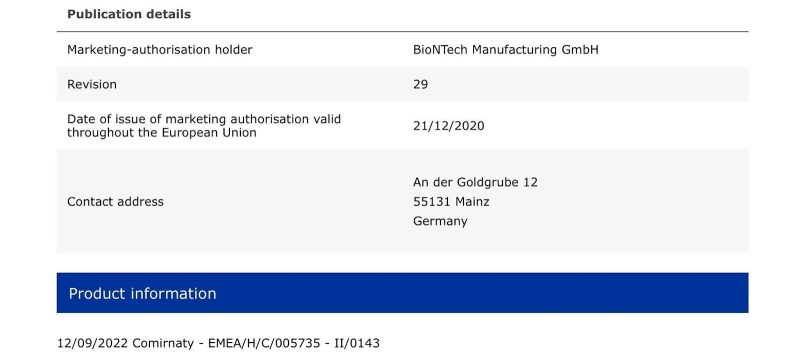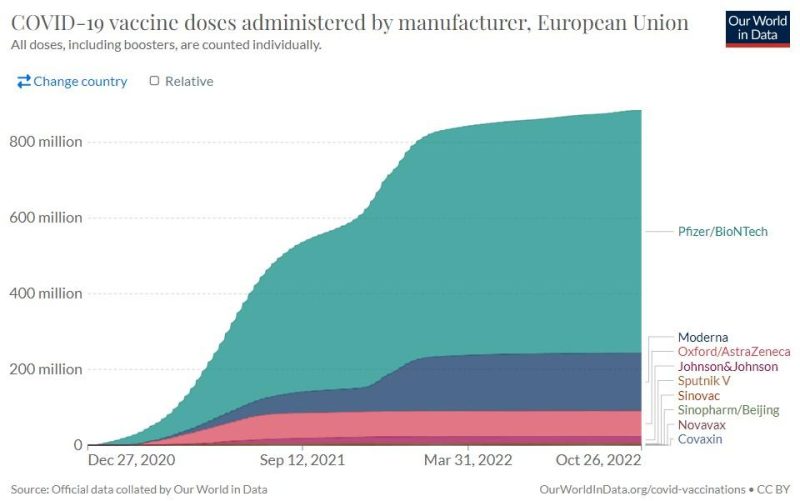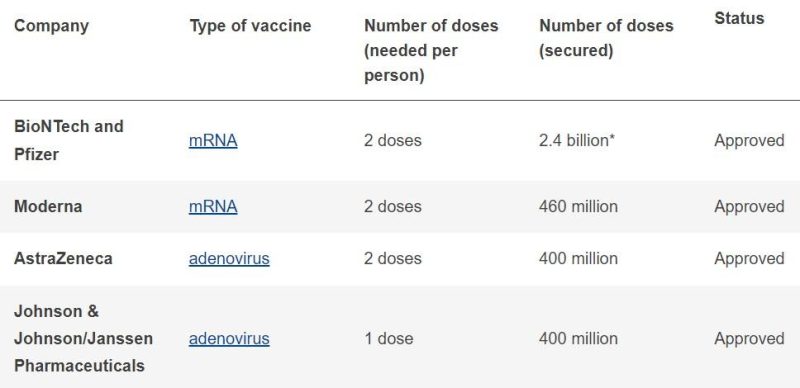A recent committee hearing in the EU Parliament gave rise to numerous dramatic soundbites that have circulated widely on Twitter and that have focused attention, in particular, on alleged misdeeds of the world’s best-known C-19 vaccine manufacturer, Pfizer.
Committee members had been hoping to ask “uncomfortable questions” – as French committee member Virginie Joron put it in a tweeted video – to Pfizer’s CEO Albert Bourla, but, following Bourla’s cancellation, had to settle instead for the hapless and hitherto unknown company representative Janine Small.
But the greater problem is that if committee members asked uncomfortable questions at all, they were asking them of the wrong company altogether and, furthermore, that in so doing, they were covering up far more uncomfortable questions: above all, for the EU itself.
The exorbitant procurement contracts that the European Commission, under the leadership of Commission president Ursula von der Leyen, signed on behalf of all EU member states were at the heart of the committee’s concerns, and suspicions of corruption hovered over the proceedings on account of text messages that the Commission’s German president is supposed to have exchanged with the conveniently absent Bourla.
The question of the hour was: Where is Bourla? In a coordinated action, vaccine-critical committee members like Joron even displayed signs reading “Where is Pfizer-CEO/Transparency?” during the session.

But the more pertinent question was: Where is BioNTech? For, although one would have had no idea listening to committee members, those contracts are not, after all, with Pfizer, but rather with a consortium of Pfizer and the German firm BioNTech and, furthermore, it is the German firm BioNTech, not Pfizer, that is the marketing authorization holder in the EU, as indeed on virtually all markets where what is in fact BioNTech’s, not Pfizer’s, vaccine is sold.

Furthermore, BioNTech is not just any German firm. It is a German firm that, as discussed in detail in my earlier Brownstone article here, has been heavily promoted and subsidized by the German government throughout its brief history. Indeed, the German government sponsored the very founding of BioNTech as part of a specially dedicated “Go-Bio” program for fostering German biotechnology start-ups, which provided not only funding, but also government mentoring, as well as assistance in attracting private investment. (See program description [in German] here.)
The European Commission’s German president, Ursula von der Leyen, was herself a member of the two successive German governments that provided “Go-Bio” start-up funding, in two rounds, first to BioNTech CEO Ugur Sahin’s research team at the University of Mainz, starting in 2007, and then to the firm after its founding in 2008. (See here [in German].) Von der Leyen was indeed a member of the German government in various capacities for no less than fourteen years, most recently as Minister of Defense, before being parachuted directly into the position of European Commission president – even though she had not even been a candidate for the post!
For over a decade, despite continuing German government support, BioNTech remained, in effect, a permanent start-up, which only ever ran losses and had never even gotten close to bringing a product to market. Until, that is, the advent of Covid-19, when the company quickly shifted focus from its work on developing an mRNA-based cancer therapy (which, curiously, it also called a “vaccine”) to developing an mRNA-based Covid-19 vaccine.
Unsurprisingly, the company’s state sponsor, Germany, would also become the main sponsor of its vaccine, providing the company a €375 million grant in support of its efforts in September 2020. On September 17, just two days after the announcement of the grant, BioNTech announced that it would be purchasing the massive production facility in Marburg that would allow it to become – virtually overnight – a major vaccine manufacturer in its own right and not merely depend on licensees like Pfizer to manufacture on its behalf.
(The purchased facility is, incidentally, the somewhat infamous Behringwerke, which, as a subsidiary of the far more infamous IG Farben chemical trust, was involved in testing experimental vaccines on concentration camp inmates at Buchenwald during the Second World War. See the first entry here, for instance, from the Buchenwald Memorial museum. But note that many more died than just the five inmates mentioned.)
But it was not only the German government that supported BioNTech’s vaccine, so too did the EU itself! Indeed, in June 2020, even before Germany stepped in with its €375 million grant, the EU’s own European Investment Bank (EIB) – under the leadership of its longtime president, former German foreign office official Werner Hoyer – had already provided the company €100 million in debt financing to support its C-19 vaccine efforts.
This was the second such credit that the EIB extended to BioNTech. In mid-December 2019 – yes, virtually simultaneously with the first reported outbreak of Covid-19 in Wuhan, China! – the EIB had already provided the company €50 million in debt financing.
It is precisely these intertwining, not to say incestuous, relationships between BioNTech, the German government and the EU itself that are being hidden by the much publicized, but completely nebulous, “scandal” about text messages between von der Leyen and Bourla. The point of bringing up the text messages is obviously to suggest corruption.
But the problem is not corruption. It is rather a flagrant conflict of interest that was built into the EU’s authorization and procurement process right from the start, but that remains invisible so long as BioNTech is ignored. This is presumably why the company was persona non grata at the hearing of the EU Parliament’s committee on Covid: officially known as the COVI (sic) Committee.
Those who only know about the hearing from Twitter will undoubtedly be surprised to learn that it involved not only Small but representatives from no less than five pharmaceutical companies and that it was the second of two such sessions, the first involving representatives from four other companies. (Full video is available here and here.)
The invitees included representatives from Moderna (CEO Stéphane Bancel), from the Anglo-Swedish firm AstraZeneca, whose Covid-19 vaccine has not even been used in the EU for well over a year, and even from CureVac, the developer of Germany’s other mRNA vaccine candidate, which never even obtained authorization in the first place! But, astonishingly, there was no presence of BioNTech: merely the owner of and marketing authorization holder for what is by far the most widely-used C-19 vaccine in the European Union.

Instead, committee members paid a private visit to BioNTech headquarters in Mainz, which included, per the program available here, “open discussion between BioNTech experts and scientists and COVI mission, and lunch: finger food buffet and refreshments.” Sounds very confrontational indeed!
But not only was BioNTech not present at the public hearing, even just the mere utterance of the word “BioNTech” in a public setting appears to be taboo for committee members.
Thus, in opening the most recent session, committee chair Kathleen Van Brempt gently chided Small’s boss Albert Bourla for not showing up, noting that he is “a person of key interest for the committee” and that the company is, after all, “the largest producer and supplier of Covid-19 vaccines in the European Union” – with no mention of BioNTech, as if there were no consortium and the company did not even exist!
This even though the information on Covid-19 procurement on the EU Commission’s own website makes unmistakably clear that the EU’s gargantuan order of up to 2.4 billion vaccine doses has been placed with Pfizer and BioNTech, and it even indeed – as well it should – gives BioNTech top billing. So, why is BioNTech CEO Ugur Sahin not a person of interest for the committee?

Later, the Dutch member of Parliament Rob Roos would light into the absent Bourla for not being interested in testifying before the committee, but indeed being interested in “billions in profits with the tax money of EU citizens.”
Is Rob Roos not aware that Pfizer splits its profits 50-50 with BioNTech and that overall BioNTech has in fact earned far more on Covid-19 vaccine sales than its American partner? (See my earlier Brownstone article here.) Did he make the same observation to BioNTech representatives over the “finger food” in Mainz?
Furthermore, does not the fact that BioNTech pays nearly one-third of its massive profits in corporate tax, thus giving the German government itself a direct interest in the company’s success, raise more important issues about the integrity of the procurement process than the fact that von der Leyen and Bourla exchanged texts?
This to say nothing of the beneficial effects on German growth of a company that went from virtually no revenues to €19 billion in revenues in a single year! Over €15 billion of those revenues represented profit, giving the company a nearly 80% profit margin. And Rob Roos and his colleagues only want to talk about Pfizer’s profits?
The French member of Parliament Michèle Rivasi would continue the oddly verbose conspiracy of silence when raising the important issue of mRNA instability: i.e., put simply, the fact that some portion of the mRNA in the vaccine is degraded and hence does not in fact work to produce the targeted antigen (the spike protein).
As Rivasi mentioned, this issue had been raised as a matter of concern by the European Medicines Agency (EMA). But the relevant EMA document requires the issue to be addressed as a “SO” – specific obligation – by the “MAH.” And what is the “MAH?” Well, it is the marketing authorization holder, of course, and the marketing authorization holder is BioNTech. Why in the world was Rivasi raising the issue with Pfizer and not with BioNTech, as the EU’s own laws require?!

But perhaps the most mind-boggling example of the parliamentarians’ fear of uttering the word “BioNTech” was provided by the Romanian member of Parliament Cristian Terhes. Terhes accused Pfizer of having begun testing of “its” Covid-19 vaccine on January 14, 2020, just days after the Chinese government published the genetic sequence of the virus. He would repeat the accusation in a subsequent, self-congratulatory press conference.
Testing may indeed have begun so quickly. It probably did, since BioNTech has never made a secret of the fact that it began developing its vaccine in mid-January 2020, right after the genetic sequence was published. See, for instance, the BioNTech “Project Lightspeed” timeline here. But Pfizer did not join the project until two months later, when it signed its collaboration agreement with BioNTech.
So, Cristian Terhes is literally here referring to BioNTech and calling it “Pfizer!” Why? Why hide the identity of the party responsible for the testing, which had to have been clearly indicated in the EMA document that Terhes cites?
Even the most highly publicized moment in the hearing was, in effect, just an exercise in grandstanding: namely, the now famous “gotcha” moment when Rob Roos supposedly got the obviously struggling Small to “admit” that Pfizer had never tested whether the vaccine prevents transmission of the virus. Rob Roos is certainly right, as he noted in a tweet, that this undermines the whole rationale for vaccine passports: “get vaccinated for others” was indeed always a lie.
But however much this lie has been repeated – above all, by governments and intergovernmental organizations like the European Union – the fact that the clinical trials were not designed to test for prevention of transmission has been known from the very start. No less an authority than Tal Zaks, then Chief Medical Officer of Moderna, publicly acknowledged it already in October 2020 – when the trials were still underway! (See Zaks’s comments to Peter Doshi in the British Medical Journal here.)
And as concerns the so-called “Pfizer” trial, by the way, BioNTech was the trial sponsor, and BioNTech is identified in the clinical trial record as the “responsible party” for the information pertaining to it. Pfizer is merely listed as a “collaborator.”

Here are the names of some of the more prominent vaccine critical or skeptical members of the EU Parliament: Virginie Joron (France), Cristian Terhes (Romania), Ivan Sinčić (Croatia), Rob Roos (Netherlands), Michèle Rivasi (France) and Christine Anderson (Germany). When will any of them get over their logophobia and start to talk about BioNTech?
If they ever do, they might want to ask the following indeed uncomfortable questions: Ought not Ursula von der Leyen to have recused herself from negotiations with a company that was so heavily promoted by a government of which she was herself a member less than one year before?
And what about Germany itself, which directly participated in the negotiations with its industrial protégé as a member of the seven nation “Joint Negotiation Team” that assisted the Commission?
